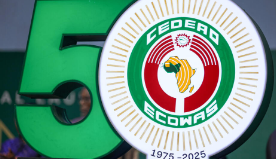ECOWAS member states have been called upon to renew their commitment to the regional bloc’s founding vision as the organisation marks its 50th anniversary.
Addressing media on the sidelines of the special ECOWAS Council of Ministers meeting opening in Accra on Monday, Mr. Ampem – who represented Finance Minister Dr. Cassiel Ato Forson – underscored the critical need for collective action to tackle pressing economic challenges facing West Africa.
Ghana remains firmly committed to the ideals of regional integration, peace and shared development, the deputy finance minister reiterated.
The two-day meeting, held at Accra International Conference Centre, marked an official launch of the series of events celebrating ECOWAS’ five decades of fostering cooperation and driving progress across the region.
Formed in May 1975, ECOWAS has long been hailed as one of Africa’s more cohesive and functional regional blocs.
Over the years it has helped facilitate trade, mobility and political dialogue across West Africa. The rise in terrorism and resurgence of military coups in several member-states – including Mali, Burkina Faso and Niger – have tested ECOWAS’s unity and resilience.
Indeed, the military regimes in those countries – currently suspended from the bloc – were notably absent from the Jubilee proceedings. That notwithstanding, Ghana’s President John Mahama, who recently assumed the chairmanship of ECOWAS, struck a conciliatory tone.
In his keynote address, he called for renewed engagement with the Sahel countries; urging the bloc to reopen diplomatic channels and avoid isolating member-states under military rule.
“Dialogue must remain at the heart of our approach,” Mahama said. These remarks signal a shift from the bloc’s earlier, more punitive stance, toward a more diplomatic and inclusive strategy.
President Mahama has made it a point to connect with Sahelian leaders, including receiving Burkina Faso’s transitional president in Accra during his own inauguration; a rare gesture that set the tone for his leadership.
The departure of Mali, Burkina Faso and Niger – who formed their own group, the Alliance of Sahel States (AES), in September 2023 – has further weakened the bloc.
Central to the talks was the Accra Initiative, an intelligence-sharing framework among West African states aimed at countering terrorism and instability in the region. These discussions tied directly into ECOWAS’s long-term vision for 2050, which aspires to create a peaceful, integrated and economically robust West Africa.
The anniversary celebrations launched in Accra will continue throughout the year, with events planned across all Ecowas member-states.
On hindsight, the bloc has fallen short of many of its bigger goals. Only one major transport corridor – linking Abidjan to Lagos – has been built. Trade within the region remains stuck at less than 15 percent of total exports.










